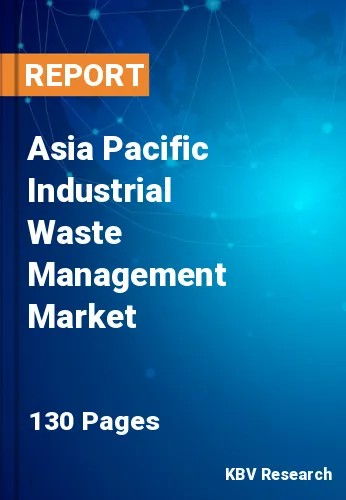The Asia Pacific Industrial Waste Management Market would witness market growth of 5.9% CAGR during the forecast period (2023-2030).
The regulatory framework governing waste disposal and environmental protection is a paramount factor influencing the industrial waste management market. Governments are implementing stringent regulations to curb industrial pollution, impose waste disposal standards, and encourage sustainable practices. Compliance with these regulations has become a critical driver for businesses, prompting them to invest in advanced waste management solutions. Companies are under increasing pressure to adopt eco-friendly practices and indicate their commitment to environmental stewardship. As a result, industrial waste management is evolving from a regulatory obligation to a strategic imperative for organizations looking to enhance their environmental credentials and maintain a positive public image.
The economic viability of waste management solutions is a significant factor influencing market dynamics. As businesses strive to balance environmental responsibility with economic feasibility, they seek cost-effective waste management strategies. Innovations offering both ecological benefits and economic advantages, such as waste-to-energy technologies, are gaining traction as companies seek sustainable yet financially viable options. As industries expand and urban areas grow, waste management infrastructure grows. This trend is propelling the industrial waste management market forward, focusing on developing efficient and scalable solutions to meet rapidly expanding industrial sectors' evolving waste disposal needs.
The Asia Pacific region has experienced rapid industrialization, leading to increased industrial activities and, subsequently, higher volumes of industrial waste. This growth in industrialization has been a significant driver for expanding the industrial waste management market. Governments in the Asia Pacific have been implementing and strengthening environmental regulations to address industrial waste challenges. The aforementioned factors will drive the market growth in this region.
The China market dominated the Asia Pacific Industrial Waste Management Market, by Country in 2022, and would continue to be a dominant market till 2030; thereby, achieving a market value of $151,944.3 Million by 2030. The Japan market is registering a CAGR of 5.2% during (2023 - 2030). Additionally, The India market would experience a CAGR of 6.5% during (2023 - 2030).
Based on Service, the market is segmented into Landfill, Recycling, and Incineration. Based on Waste Type, the market is segmented into Construction & Demolition Waste, Manufacturing Waste, Mining Waste, Agriculture Waste, Chemical Waste, Oil & Gas Waste, Nuclear Waste, and Others. Based on countries, the market is segmented into China, Japan, India, South Korea, Singapore, Malaysia, and Rest of Asia Pacific.
Free Valuable Insights: The Global Industrial Waste Management Market is Predict to reach $1.6 Trillion by 2030, at a CAGR of 5.6%
The market research report covers the analysis of key stakeholders of the market. Key companies profiled in the report include Veolia Environnement S.A., EnviroServe (Savage Companies), Covanta Holding Corp. (EQT AB (PUBL)), Waste Management, Inc., Stericycle, Inc., Daiseki Co., Ltd., Clean Harbors, Inc., Remondis SE & Co. KG, Republic Services, Inc. (Cascade Investment Group, Inc.), and Sembcorp Industries (Temasek International Pte Ltd)
By Service
By Waste Type
By Country
Our team of dedicated experts can provide you with attractive expansion opportunities for your business.

